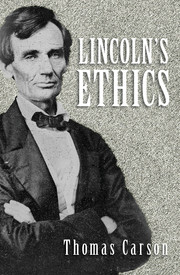Book contents
- Frontmatter
- Dedication
- Epigraph
- Contents
- Detailed Contents
- List of Maps and Figures
- Acknowledgments
- How This Book Came to Be
- 1 Introduction
- PART ONE LINCOLN THE POLITICIAN AND COMMANDER IN CHIEF
- 2 Lincoln's Evolving Policies Regarding Slavery: Compromise and Utilitarianism
- 3 Habeas Corpus, Colonization, and the Status and Rights of Free African Americans
- 4 Did the Union Have Just Cause for Fighting the American Civil War?
- 5 Jus in Bello: Did the Union Fight the War Justly?
- 6 Moral Luck and Lincoln's Good Moral Luck
- PART TWO LINCOLN'S MORAL CHARACTER
- Bibliography
- Index
- Plate Section
2 - Lincoln's Evolving Policies Regarding Slavery: Compromise and Utilitarianism
from PART ONE - LINCOLN THE POLITICIAN AND COMMANDER IN CHIEF
Published online by Cambridge University Press: 05 May 2015
- Frontmatter
- Dedication
- Epigraph
- Contents
- Detailed Contents
- List of Maps and Figures
- Acknowledgments
- How This Book Came to Be
- 1 Introduction
- PART ONE LINCOLN THE POLITICIAN AND COMMANDER IN CHIEF
- 2 Lincoln's Evolving Policies Regarding Slavery: Compromise and Utilitarianism
- 3 Habeas Corpus, Colonization, and the Status and Rights of Free African Americans
- 4 Did the Union Have Just Cause for Fighting the American Civil War?
- 5 Jus in Bello: Did the Union Fight the War Justly?
- 6 Moral Luck and Lincoln's Good Moral Luck
- PART TWO LINCOLN'S MORAL CHARACTER
- Bibliography
- Index
- Plate Section
Summary
Lincoln thought that slavery was morally wrong and famously said, “If slavery is not wrong, nothing is wrong.” He called slavery a “monstrous injustice” and said that no people were ever wronged as greatly as African slaves in America. Yet before 1864, he made many political compromises with slavery, including the following:
He was not an abolitionist until 1864, late in his presidency. When he ran for the Senate in 1858 and for president in 1860, he opposed any further extension of slavery but did not advocate its immediate abolition.
In his First Inaugural Address, delivered in March 1861, Lincoln made many concessions to slaveholding interests to try to placate the South and avert a civil war. For instance, he promised to enforce the Fugitive Slave Law. On other occasions around this time, he even promised to enforce it better than had previous presidents. He promised not to interfere with the institution of slavery where it existed and also not to oppose a constitutional amendment to prohibit the federal government from interfering with slavery where it existed.
His initial war aims put the preservation of the Union ahead of the abolition of slavery.
He rescinded General Fremont's order of partial emancipation in Missouri in 1861 and in 1862 he rescinded General Hunter's order of emancipation for the entire states of Florida, Georgia, and South Carolina.
The Emancipation Proclamation was seemingly half-hearted; it failed to free slaves in the border states, Tennessee, or most of the Confederate territory occupied by the Union Army when it went into effect. Some critics indeed said that the Emancipation Proclamation freed no one: “it applied where the Union had no power and did not apply where it did [have power].”
There is much to question here. Given the tremendous evil and injustice of slavery, all of these actions were prima facie very wrong.
- Type
- Chapter
- Information
- Lincoln's Ethics , pp. 23 - 85Publisher: Cambridge University PressPrint publication year: 2015



